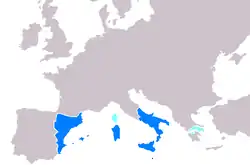Expulsion of the Jews from Sicily
The expulsion of the Jews from Sicily began in 1493 when the Spanish Inquisition reached the island of Sicily and its population of more than 30,000 Jews.
| Part of a series on |
| Jews and Judaism |
|---|
|
History of Sicilian Jews
At the time of its expulsion from Sicily, the Jewish community in Sicily dated back to early Roman times. They were relatively untroubled on the island until the acceptance of the Crown of Aragon in Sicily in 1412. A great number of Jews had reached Sicily after Pompey's 63 BC sacking of Jerusalem.
After their enslavement under Roman rule, Jews in Sicily eventually assimilated into society and worked in professions such as philosophy, medicine, artisanal pursuits, and farming.
The exact number of Jews in Sicily at the time of expulsion is not certain, However, some have put the number of Jewish refugees at 36,000.[1] Also, in 1492, it is known the Jewish populations of Palermo, Messina, and several other cities were considerable, and that there were Giudeccas, or Jewish settlements, in over 50 places in Sicily, ranging in anywhere population from 350 to 5,000. At their height, Jewish Sicilians probably constituted from five to eight percent of the island's population. The order wasn't only directed towards Jewish Sicilians but also a smaller number of Muslims and other religious communities were forced to convert.[2]
Spanish Inquisition and Jewish Expulsion

Muslims had ruled much of the Iberian Peninsula since the first invasion in 711. By the late Middle Ages, Christian kings had begun to wage war on the Moors and recapture some of the peninsula. After the marriage of Ferdinand II of Aragon to Queen Isabella I of Castile, the Moors were finally forced out of Granada in 1492, completing the so-called Reconquista of the Iberian Peninsula.
In 1479 Sicily and Malta came under Aragonese rule. In 1492, as part of an attempt to maintain Catholic orthodoxy and purify their kingdom of Moorish influence, Ferdinand and Isabella ordered the forced expulsion or conversion of all Jews on pain of death. The date of the expulsion was extended from 18 September 1492 to 12 January 1493 to allow the extortion of opportunist tax levies.
Many Sicilian Jews fled to the neighboring mainland of Calabria, where the Spanish Inquisition came later. Not all of the Sicilian Jews or other religious communities departed. A small number of Sicily's Jewish community converted to Catholicism and remained on the island.[3]
The great part of the Sicilian Jewish community fled to the Ottoman Empire, especially to what is since the 20th century Greece, Cyprus and Turkey, and were well received there. The settlements of those Jews were in Greece and Turkey were large enough great to build their own congregations and to print books.[4][5]
The Jews have never returned en masse to Sicily. However, in 2005, for the first time since the expulsion, a Passover seder was conducted in Sicily (in Palermo), held by the Milanese progressive rabbi.
References
- "2000 years of Jewish Presence in Greece".
- Norwich, John Julius (2018). History of Sicily: From Antiquity to Cosa Nostra. Paris: Tallandier. p. 447. ISBN 979-10-210-2876-0.
- "Jewish life in Sicily reborn".
- "Chronika" Vol. 57, Periodical of the Central Board of Jewish Communities in Greece, Athens March 1983, Greek transl. from Goldschmidt, D. In Sefunot, Vol. 13, Jerusalem, Ben Zvi Institute 1971–1978 (Hebrew) "Prayerbooks of the Jews of Greece“.
- Nosek, B. Italian and Sicilian Piyyut in contemporary Context and its unique Contribution to further poetical Output Bedřich Nosek, CSc. Mgr. Sylva Ondrejičková Praha, 2011 (Czech)